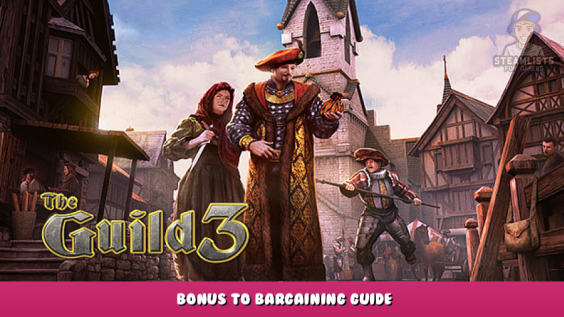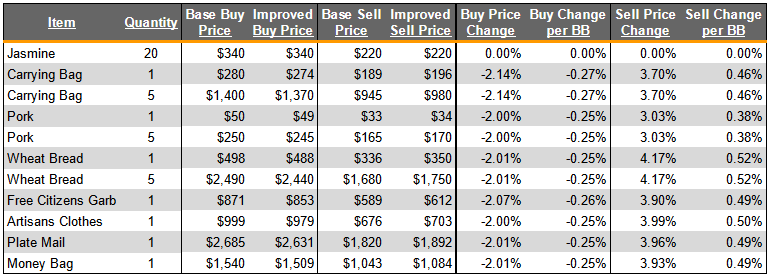
What is Bonus to Bargaining?
“Bargaining enables the character to achieve better prices when purchasing and selling goods at marketplaces.”
Bonus to Bargaining (“BB”) is a minor character stat influenced by Charisma and Intelligence. The stat can be further improved by modifiers on a few clothes and artefacts.
Introduction
Welcome Patrician! In this guide, you will find a detailed explanation of the Bonus to Bargaining stat in the Guild 3.
Keep in mind that you will find both facts and opinions here.
I plan on editing this guide and adding new ones as I discover useful information about other mechanics. If you are missing information or something is wrong in this guide, please let me know in the comments below.
Please remember to rate this guide if it has been useful for you. This is my first guide so I’d also appreciate any feedback. Thank you!
Please note:
The highlights provided in the below TLDR section are sufficient to explain this stat for gameplay purposes. This is a fairly long guide which concludes with several recommendations for the devs to “fix” this stat in particular, followed by a lengthier rant about the game’s broader systems in the Epilogue.
TLDR
Each “point” in Bonus to Bargaining provides NEGLIGIBLEimprovements to per unit buying prices (-0.25%) and selling prices (+0.50%) at the marketplace.
In its current form, it is not a worthwhile stat to care about for ANYcharacter (including transporters). It is very underpowered compared to other useful stats.
Finally, items with a “Bonus to Bargaining” modifier have TERRIBLE return on investment (“ROI”) and should be avoided in favor of other investments.
Inquiry
That tooltip is nice but what exactly does “Bonus to Bargaining” do?
Like many niche mechanics in this game, I found the vague tool-tip description inadequate to determine if this stat was worth focusing on at all. I went to Google and searched for answers and, unfortunately, the wiki, guides, and forum discussions had yet to delve into the secrets of “Bonus to Bargaining” (“BB” for short). Thus, this guide explore my thought process, research, and findings about BB as a mechanic.
Hypothesis
My initial hypothesis was that every point in BB was a direct % decrease in total purchase price of a transaction and a direct % increase in total selling price of a transaction. If correct, this would make BB a very valuable stat for transporters in particular since they conduct so many transactions at marketplaces.
To improve my transporters BB, I could provide them with “Free Citizen’s Garb” clothing to get a +8 BB modifier for around $850. At that price, it seemed like it could be a reasonable investment – essentially reducing trade expenses and increasing trade income by 8% each.
I performed a quick break-even calculation using my assumption which suggested the clothing would pay for itself after buying/selling ~$10,625 in goods and generate pure profit after that point (Calc: $850 / 8%). Considering that one transporter can buy/sell a few thousands worth of goods each day (depending on business), it seemed like ROI could be pretty good.
The First Test
As I was playing a barber / scholar game at the time, I decided to test my hypothesis on a purchase that a barbershop transporter would frequently make: 20 Jasmine. I spent $850 of my hard earned currency to purchase one set of Free Citizens Garb. I collected a baseline price first with my dreary Robust Clothing equipped – which was $340 for 20 Jasmine.
After joyfully swapping into my new swag, I was on the edge of my seat when I evaluated the “improved” price… and it was $340. An improvement of zilch… nada… nothing.
Devastated by seeing no improvement in price (and now $850 poorer), my initial hypothesis lay in tatters. However, I was more determined than ever to understand the inter-workings of BB.
Test Table
Findings
These findings are very disappointing. The effective benefit of BB is less than half of what I predicted and it doesn’t even apply to all goods due to the calculation being conducted on a per-unit basis and price rounding. This further limits its usefulness for businesses trading low-value goods.
Return on Investment
To more clearly show the weakness of this stat, I re-ran the break-even calculation on the Free Citizen’s Garb (the highest +BB/$100 item in the game).
To BREAK-EVEN on a single Free Citizens Garb, a transporter would have to:
- Buy at least $21,250 in goods; or | Calc: $850 / (+8 BB x 0.50%)
- Sell at least $42,500 in goods | Calc: $850 / (+8 BB x 0.25%)
This analysis puts the weakness of this stat into perspective. The ONLY benefit of this stat is to INCREASE wealth – yet AT LEAST $21,000 worth in transactions are necessary to start earning ANY ROI at all due to the tiny price improvement each additional point in BB has.
Spending money to enhance this stat with items (like the Free Citizens Garb) is not worth it. These items just cannot generate enough ROI compared to other items that can improve transporters – let alone other kinds of investments.
Conclusions
After concluding my research I am left feeling disappointed because it seems clear that the Bonus to Bargaining stat is underpowered compared to other stats. I am also very frustrated that it took this much effort to understand a “minor” stat in a game all about character stats.
This is not how I want to feel like when playing a game.
To rectify these issues, I humbly request that the devs consider implementing the below recommendations when possible. I know nothing here is gamebreaking (and their are probably more major issues on the agenda) but I believe they could help make the game more enjoyable (or at least less frustrating) for players.
Recommendations
1. Buff Bonus to Bargaining
This stat is not versatile as it could only ever really be impact for transporters – yet it is next to useless in its current form. It is a one-trick pony with a lackluster trick.
Equipable items like the Free Citizen’s Garb are unlikely to ever generate sufficient ROI to justify their use over other items or investments. Even, if a player were to focus on improving this stat on their transporters “organically” with attribute points rather than items, the end result would be negligible.
Further, there are other stats that are just objectively better to improve for transporters. Specifically, it is much more useful to improve a transporter’s speed and storage due to their versatility and substantial improvements to transporter efficiency. Why would I ever purchase a Free Citizens Garb rather than a Riding Horse which nearly doubles a transporters efficiency for only ~$600 more? Plus, I can easily transfer the Riding Horse to many other kinds of employees (or my main characters) and still benefit from the modifiers it provides.
Even worse, until now, players had no real way to realize how poor this stat was compared to others which leads to my second recommendation.
2. Increase Stat / Mechanic Transparency
The tool-tip description doesn’t cut it – it is far too vague. This is not just an issue with Bonus to Bargaining, but many of the stats shown in the character menu.
I would propose either:
- Use more intuitive values for ALLcharacter stats (i.e. speed is shown as a %); or
- Add an additional line in tool-tips (or the Tutorial guide) which EXPLICITLY shows the calculations and impact of the stat. I don’t actually care about increasing “Bonus to Bargaining”, I care about the % price increases / decreases that are derived from it.
The importance of any stat / mechanic is not just knowing WHAT it does, but TO WHAT EXTENT it does it. How can a player understand, let alone assess, something without having any indication about the latter?
A player could easily read the current description and think: “Man this stat seems really important to focus on for transporters” (as I initially did). They might then spend a bunch of money to give all of their transporters Free Citizens Garbs and level up their transporters charisma, only for it to result in negligible (or negative) results.
This could result in the player feeling annoyed, confused, and/or disappointed. It may also end up leaving players with a sense that either they made a mistake or that their decisions have little impact.
To some degree, both of those “senses” would be correct but due to the lack of information players have no way to know. Players feeling that their decisions have little impact is particularly problematic as it hampers the “connection” they feel to THEIRsimulation which could reduce play-time, replayability, and opinions about the game more broadly.
Epilogue
Fair warning: The rest is a bit of a rant
Unfortunately, the Bonus to Bargaining stat doesn’t seem to be alone. It, and several others, feel like an unfortunate waste of potential. They simultaneously have minimal impact on the game yet provide the player with too little information to adjust their decisions accordingly.
I think a more widespread assessment is urgently needed to examine the “balance” of the character stats along with the information provided to the player about each stat. I suspect that such an assessment would find many stats have very minimal impact on the game and that information about the inner-workings of the mechanics are insufficient across the board.
In my opinion, both of these issues should be addressed across the board by making more stats feel more meaningful (i.e. buffing many stats) and improving player access to information (i.e. improving tool-tips).
If these broader solutions are implemented, I believe it would give players a more enjoyable experience by enabling more genuine strategy and providing the opportunity to enjoy more unique play styles.
In my opinion, the best part of simulation games is that players have to make impactful decisions with balanced trade-offs (i.e. do I want my transporters to move noticeably faster ORget noticeably better prices at the market ORspend a lot for both benefits).
By having objectively better / worse stats, it nudges players to identify a “meta” and stick to it. This discourages exploring for new strategies and narrows the number/type of “legitimate” play-styles.
I wonder if this is part of the reason players don’t feel the same love for this game as they do for Guild 2. Perhaps it’s (at least partially) because in Guild 3, many player-made decisions feel like they have low-impact, are based on vague information, and are artificially limited to a set of objectively superior play styles.
If correct, maybe this results in a more disconnected, dull, and distant feeling toward Guild 3. Comparatively, maybe in Guild 2 players feel like they have have more control to make a broader variety of impactful decisions which both create and prevent chaos.
With all that said, I want to emphasize that I really do enjoy Guild 3. In particular, I think the game has a lot of potential. I hope the latter sections of this guide help to improve the game in some way or at least provide a novel, thoughtful perspective on the game for the devs to consider.
Thanks for reading <3
Hope you enjoy the Guide about The Guild 3 – Bonus to Bargaining Guide, if you think we should add extra information or forget something, please let us know via comment below, and we will do our best to fix or update as soon as possible!
- All The Guild 3 Posts List




Leave a Reply